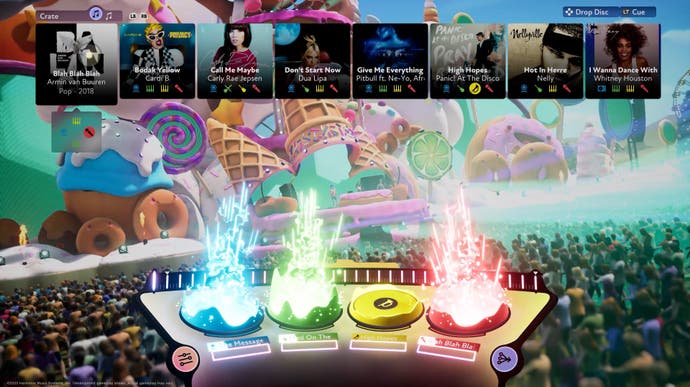Harmonix's Fuser is a music creation tool disguised as a game
Chex this mix.
Harmonix has developed many games about recreating and performing music. This time around, the Guitar Hero and Dance Central studio wants players to get creative. Fuser is all about creating mashup remixes out of popular songs, either in a campaign, freestyle mode or multiplayer.
After preview events earlier this year, this is the first extended hands-on with Fuser, giving me a full four days with 31 songs, two campaign missions and the freestyle mode.
You manage four channels - each song is divided into drums, a bassline, and a melody instrument such as synths or strings and vocals. Each of these categories is mapped to a fixed button, so you always press the right-hand button for the vocal track, the left hand one for drums and so on. As intuitive as the controls are, Fuser is immediately a lot. Unlike previous Harmonix games, which have you focus on your instrument by relegating the crowd and your avatar to the background, there's a whole music festival virtually standing between you and your table. Initially, I had a good giggle at the idea that attendees at a huge festival like that would dare to shout "I want country!", but it's just one of the ways in which gameplay doesn't really fit the rest of Fuser's ideas. The skill it asks of you lies in dividing your attention between crowd requests, in-game tasks and, oh yeah - making actual music. Fuser is such a departure for Harmonix not only because it ditches the dexterity challenge of classic rhythm gaming, but because the developer is actively trying to reach players who either aren't interested in music gaming as a test of skill, or are unable or unwilling to invest in peripherals by basing everything around your controller only.
"With how things have developed, Fuser is coming at the right time," marketing director Dan Walsh tells me, referring to how the coronavirus crisis has made it more difficult for peripherals to be produced and shipped. "But the overall accessibility was our main concern from the beginning. Fuser works the same no matter what platform or controller you play with, and there is no wrong way to play it."
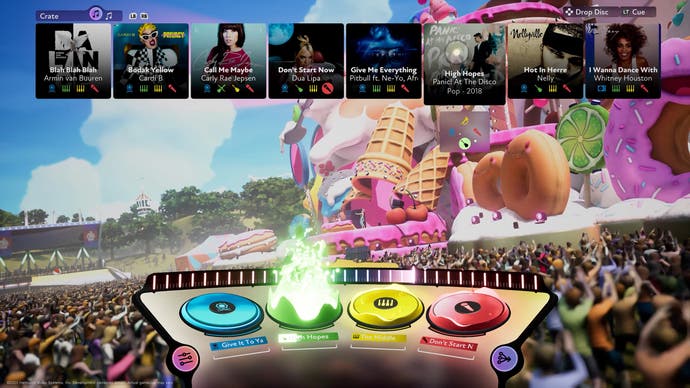
Walsh also mentions Fantasia: Music Evolved and DropMix, the latter of which is probably the closest to Fuser but struggled due to the large board it required and its prohibitively high price at launch. "DropMix used the mechanics of a board game, and asked players to make strategic decisions that weren't about the music, first and foremost," Walsh says. "With DropMix and Fantasia, we went into the direction of introducing more player agency, something Guitar Hero for example didn't have. With a game like Guitar Hero, your experience with a song and my experience are going to be indistinguishable, we both reach a five star rating the same way. In Fuser, skill has a completely different meaning."
Product director Daniel Sussman adds: "We're never gonna tell you your mix is bad. Taste is subjective. We're asking you to put yourself out there and we're not gonna punish you for that."
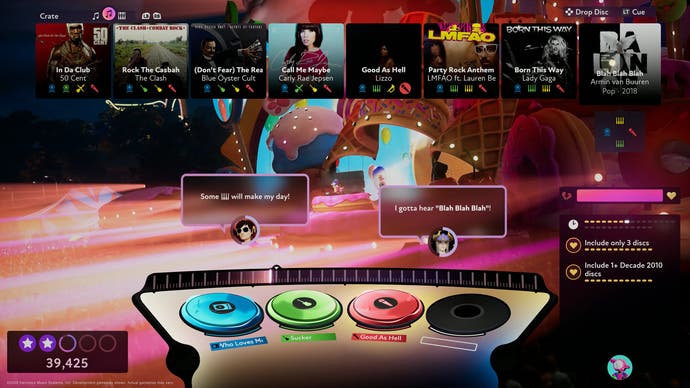
There are few categories you're actually scored on, and you can't lose points, but I soon discover that what brings you points isn't necessarily musically interesting. This regularly put my instincts as a musician and a player at odds with each other. Let's say you've just found a mix of tracks you want to keep going for a bit, only to be interrupted by a request. Whatever the digital festival-goer shouts at you might go terribly with your current mix, so you likely won't change just one thing, but everything. Sure, it keeps you on your feet, but it gives you very little time to just enjoy the music for a bit or wait until the song has reached a good point for a break. You have the option to ignore the request, but fulfilling requests and quickly changing anything on the fly is ultimately where the points come from. There's also an overall crowd appreciation meter that's likely driven by the software interpreting how well your chosen tracks go together. To satisfy Fuser's requirements as a game, I sometimes ended up building mixes I personally didn't like, even though most tasks are open to your interpretation, like "play a song from the 2010s" or "only use three discs".
Everything is automatically mapped to the same beat and the same key, but I'm assuming tracks where the vocals have to be immensely sped up to fit the beat will make you less of a hit with the crowd than those that have a more natural fit. As a player going for a high score, it worries me that I sometimes can't tell what exactly I'm scored on. All I know for certain is you get the most points for dropping and ejecting tracks on the downbeat. There's a visual aid showing you the timing depending on your beat, but if you don't drop a record immediately and instead hover it over the plate by holding down the button, you also see markers for points at which it would sound more natural and interesting to drop a new melody or beat. The fact that making points and making something that sounds good can at times be mutually exclusive is Fuser's one big letdown. At times, the software defiantly works against you to make something it deems acceptable, too: I did try my best to break the game, but if something doesn't go with the rest, Fuser is likely to just mute sections of the offending disc or use it to replace the track it's at odds with. Things can still sound awkward - I got a small victory out of successfully finding a place for tracks that didn't seem to go with anything at first, but more often than not, I felt Fuser was gently taking the reins before I could make ears bleed.
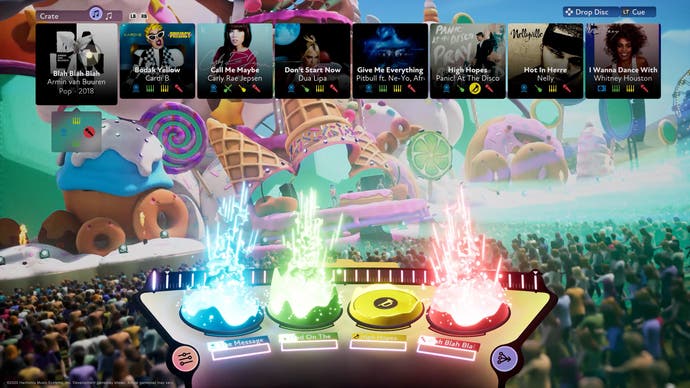
With Fuser, Harmonix stresses diversity and open-mindedness. Your avatar doesn't have a set gender, and there is a generous array of body types and skin tones. Similarly, Fuser forces you out of your musical comfort zone by making you familiarise yourself with songs you might not know or like. The demo has a big focus on rap and pop songs, but then there's a lone country song, daring me to use it with a host of songs that couldn't be more different. I ask Walsh and Sussman if these real-life musical differences ever lead to difficulties in licensing music.
"We've definitely had artists tell us no because they're not comfortable with being remixed in this way," Walsh says. "Artists from the 2010s who are more familiar with mashup culture and remixes were generally more open to the idea when we've explained what Fuser is."
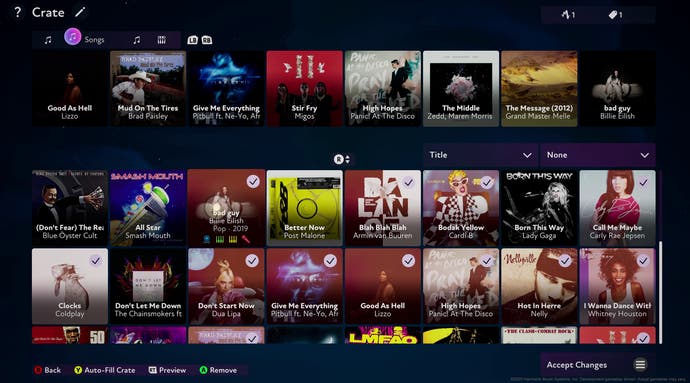
The first stage you play in the demo is the full game's first stage and thus features a short tutorial. The second stage available to me is one from later in the game and features a previously unavailable sample pad. At one point, you need to create a short loop with your pad, record it, and then use it in your mix. This requires me to navigate to a menu, choose a sample pad, roughly know what sound it makes and what I'm going for and record, all within a time limit. It's a lot. It's not something you can be good at using the skills games usually ask of you, and it does give me great respect for real-life DJs. You will have to get intimately familiar with the up to 16 songs you're using at a time. Whenever I'm not playing, I've been whistling the horn section from Lizzo's Good As Hell, because thanks to Fuser I now know what it sounds like. I also know it goes great with the bass line from Rock the Casbah. To me, these are exciting discoveries to make. I love to be able to take songs apart, listen to what makes them so recognisable and then use that in a different context, but getting to know something so well takes time, time the campaign mode likely won't give you. I've already played most of my hours in Freestyle Mode because the feeling of it all coming together, of it sounding just right, is better to me than any high score. But in Fuser, the chase for a high score and freedom of expression are often the only things that don't mix, even when everything else does.
